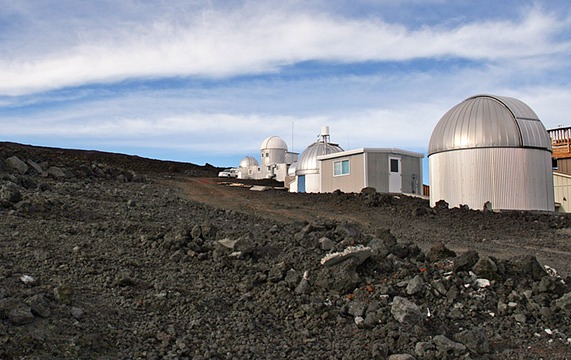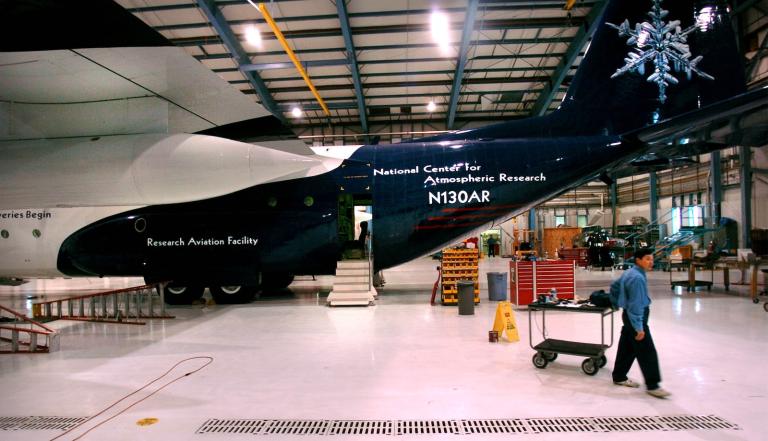The National Journal has a long piece out, “The Coming GOP Civil War Over Climate Change: Science, storms, and demographics are starting to change minds among the rank and file.”
Back in October 2010, NJ ran an article explaining, “The GOP is stampeding toward an absolutist rejection of climate science that appears unmatched among major political parties around the globe, even conservative ones.”
Now reality is biting back, or, perhaps more accurately, nibbling back. The new piece begins with MIT climatologist Kerry Emanuel, a registered Republican since 1973. He switched his registration to “independent” shortly after a not-so-successful meeting with Republican presidential candidates in the run up to South Carolina’s GOP presidential primary, a meeting arranged by the influential Charleston-based Christian Coalition of America:
“The idea that you could look a huge amount of evidence straight in the face and, for purely ideological reasons, deny it, is anathema to me,” [Emanuel] says.
Emanuel predicts that many more voters like him, people who think of themselves as conservative or independent but are turned off by what they see as a willful denial of science and facts, will also abandon the GOP, unless the party comes to an honest reckoning about global warming.
Certainly recent polls (see here) make clear climate change is a political winner. It is a classic wedge issue that divides Tea Party extremists from independents and moderate/liberal Republicans. NJ explains:
The problem is, as polling data and the changing demographics of the American electorate show, it’s likely that the position that can win voters in a primary will lose voters in a general election. Some day, though, the facts — both scientific and demographic — will force GOP candidates to confront climate change whether they want to or not. And that day will come sooner than they think. …
“These polls show that there are a lot of people who are inclined to vote Republican — and believe America should respond to climate change,” says Edward Maibach, director of the George Mason program. “Republicans aren’t inclined to respond to it right now, but in the future, if they don’t take these issues seriously, they’re inclined to alienate a lot of Republican voters.”
As one of the leading experts on public opinion analysis in this area, Stanford’s Jon Krosnick, explained back in October, candidates “may actually enhance turnout as well as attract voters over to their side by discussing climate change.”
Some Republicans have started to figure this out, but that means taking on the Tea Party extremists and their well-funded pollutocrat backers like the Kochs:
And a quiet, but growing, number of other Republicans fear the same thing. Already, deep fissures are emerging between, on one side, a base of ideological voters and lawmakers with strong ties to powerful tea-party groups and super PACs funded by the fossil-fuel industry who see climate change as a false threat concocted by liberals to justify greater government control; and on the other side, a quiet group of moderates, younger voters, and leading conservative intellectuals who fear that if Republicans continue to dismiss or deny climate change, the party will become irrelevant.
“There is a divide within the party,” says Samuel Thernstrom, who served on President George W. Bush’s Council on Environmental Quality and is now a scholar of environmental policy at the American Enterprise Institute, a conservative think tank. “The position that climate change is a hoax is untenable.”
A concerted push has begun within the party — in conservative think tanks and grassroots groups, and even in backroom, off-the-record conversations on Capitol Hill — to persuade Republicans to acknowledge and address climate change in their own terms. The effort will surely add heat to the deep internal conflict in the years ahead. [emphasis added]
The National Journal says some of the fossil fuel companies backing the right-wing deniers are changing their position:
It’s long been taken as a truism that the powerful oil lobby is the reason nothing happens on climate change in Washington. For many years, that was indeed true. In particular, Exxon Mobil, the nation’s largest oil company and a major contributor to Republican candidates, was associated with a campaign to fuel skepticism about climate science. From 1998 to 2006, Exxon Mobil contributed more than $600,000 to the Heartland Institute, a well-known nonprofit group that holds conferences and publishes books aimed at debunking the science of climate change. Exxon Mobil’s support of Heartland made sense. The oil company stood to take a financial hit from “cap-and-trade” climate-change proposals that would have priced carbon pollution from oil.
For a number of reasons, that equation is changing. Exxon Mobil has ended its support of Heartland’s agenda. It’s not that the oil giant has had a green awakening; it’s just that a series of internal changes have positioned the company to profit from at least some policies that price carbon emissions. …
And the position on climate change at Exxon Mobil that once helped fund the Heartland conferences? “We have the same concerns about climate change as everyone. The risk of climate change exists; it’s caused by more carbon in the atmosphere; the risk is growing; and there’s broad scientific and policy consensus on this,” [company spokesman Alan] Jeffers says.
But even if Exxon Mobil were truly softening on the issue, which is a dubious proposition at best, the hardcore polluters have simply upped the ante.
After quoting Marco Rubio’s recent denialist statements — such as “When we point out that no matter how many job-killing laws we pass, our government can’t control the weather, [Obama] accuses us of wanting dirty water and dirty air” — NJ explains:
Rubio’s view is likely to remain the mainstream one in the party in the short term, thanks to tea-party groups such as Americans for Prosperity, a super PAC founded by David and Charles Koch, the principal owners of Koch Industries, a major U.S. oil conglomerate.
Over the last several years, Americans for Prosperity has spearheaded an all-fronts campaign using advertising, social media, and cross-country events aimed at electing lawmakers who will ensure that the fossil-fuel industry won’t have to worry about any new regulations. The group spent $36 million to influence the 2012 elections.
“We’ve been having this debate with the Left for 10 years, and we welcome having the debate with these new groups. If there are groups who want to do a niche effort with the Republican electorate, we’ll win that debate,” says the group’s president, Tim Phillips. He’s not worried that organizations such as Combs’s Christian Coalition or economists such as Laffer will influence lawmakers — because AFP would hit any such candidate with an all-out negative campaign. “Let them bring a carbon tax on. They know it’s political death for them to bring this forward on their own.”
So right now there is mostly a standoff for the GOP. The deniers can dominate the primaries with voters and fossil-fuel funding for the time being, but that denial hurts them in many statewide and national elections.





